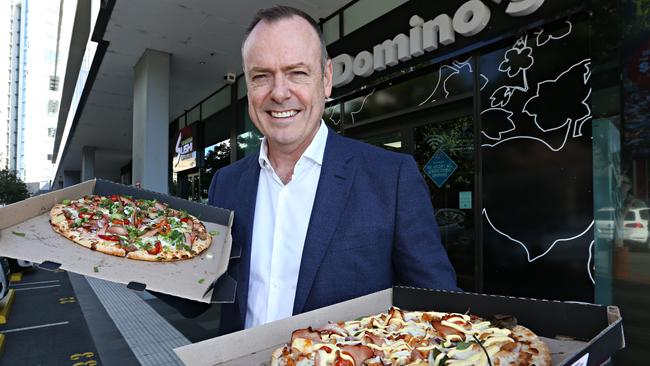Overseas stores turn into a burden for Australian companies
Retailers who thought opening overseas was a smart move are being punished by COVID-19 lockdowns in Europe, US and Asia.

Australian retailers with stores in overseas shopping centres and suburban strips are being punished on two fronts, as a collapse in consumer confidence at home is exacerbated by coronavirus lockdowns in European, American and Asian cities.
Having overseas stores has been viewed as a source of strength and a smart way to diversify companies’ earnings.
But firms from pizza stores to jewellery shops, fashion and furniture outlets, are finding that their once-booming and promising international expansion plans are now proving a burden.
For a company like Domino’s the lockdowns in Europe could prove particularly damaging. It has more than 1000 stores in western Europe that generate almost one third of the pizza group’s total earnings.
On Friday investors could learn more from billionaire Solomon Lew’s Premier Investments, when it reports its half-year results, about its hundreds of overseas Smiggle shops across Britain, Ireland, Malaysia, Hong Kong and New Zealand.
One of the nation’s most successful retailers to make it big overseas, furniture store Harvey Norman, revealed on Thursday its stores in Slovenia, Croatia and Malaysia would be closed by government decree, as global politicians scramble to deal with the coronavirus pandemic.
It’s the same for jewellery operator Lovisa, which has an extensive overseas portfolio of stores, especially in Europe and the Middle East.
Meanwhile fast-food stores, including those operated by Collins Foods and Domino’s Pizza, face an earnings slump due to restrictions on people’s movements of people and a collapse in tourism.
Among other retailers, home furnishings store Adairs has decided to suspend its already announced 7c per share interim dividend, deciding in the current pandemic and unfolding economic crisis it is more prudent to hold onto its cash for now.
Lovisa, in an update, said production capacity at both its suppliers and distribution hub in China have begun to return to normal levels.
However the chain said it continued to experience delays in freight movements out of China and uncertainty in timing of supplier deliveries.
In terms of the disruption to its business, Lovisa said all of its stores in France and Spain have been closed since Sunday, with those in Spain expected to remain closed until at least the end of the month. France’s shutdown is expected to continue until the middle of April.
It said all of its Lovisa stores in Malaysia have been closed since Wednesday and are expected to remain closed until at least the end of the month as a result of a government imposed shutdown. In the US, 25 stores are closed or closing as a result of local government directives for shopping malls to close until at least early April.
“All other markets are currently still open and trading, however have seen a declining sales trend with large decreases in store traffic in recent days,” Lovisa said. “This, when combined with the above impacts, has resulted in a significant deterioration in sales.”
Domino’s, which has an extensive network of 1000 pizza stores across France, Germany, The Netherlands and Denmark, said it would shut all its stores in France for 15 days in keeping with government guidelines.
“In France it is clear our community prefers businesses to close and, in an environment in which several quick service restaurants have closed, the community expects the same of Domino’s,’’ said Domino’s chief executive Don Meij.
“In other markets the community preference is for stores such as ours to continue to serve our customers particularly through delivery. We respect both of those positions.
“We will reassess the situation at the end of the 15-day period and make whatever decision is right for the community at that time in terms of a resumption in trading.”
Domino’s said it is unclear what the long-term impact will be on its group earnings.
It comes as shopping centre owners like Scentre, one of the biggest in Australia, have pledged to work with their retail tenants, although it has stopped short of saying it will provide rent relief to retailers as shopping centres begin to look like ghost towns.





To join the conversation, please log in. Don't have an account? Register
Join the conversation, you are commenting as Logout